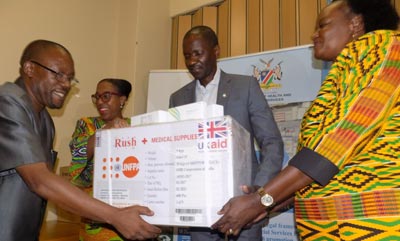
State-of-the-art Bio-Safety Level 3 laboratory commissioned at medicine faculty

By Clifton Movirongo.
The German Ambassador to Namibia, HE Herbert Beck, officially inaugurated a Bio-Safety Level 3 laboratory, on Monday 24 April, at the University of Namibia’s School of Medicine to strengthen the resilience of the Namibian health system.
“This new laboratory will help to strengthen Namibia’s ability to increase responsiveness and capacities in the country’s health sector as a whole, with close cooperation with the Ministry of Health and Social Services, Namibia Institute of Pathology, and other stakeholders.”
The joint project is funded by the German Ministry for Economic Cooperation and Development through the German Development Bank, (KfW) for N$6 million, and implemented by the Deutsche Gesellschaft für Internationale Zusammenarbeit (GIZ).
Courtesy of the German Government, the GIZ has procured another N$3.5 million worth of equipment and material. The GIZ also pays some of the technicians to help develop local human capacity.
A crucial pillar for improving health care in the medium and long term and reducing the burden of infectious diseases is the existence of research and diagnostic capacities in Namibia, according to the officials.
The laboratory, designed in compliance with international standards and manufactured in South Africa, comprises a containerized structure with medical equipment and a dedicated plant room for filter-controlled airflow. “This state-of-the-art laboratory incorporates a series of facilities such as Reagent Preparation, Specimen Receiving, Ante, Culture, and Detection Rooms,” they stated.
The government, through UNAM, contributed N$1 million to the project. The funding will enable the University to deepen its longstanding academic ambitions, such as enhancing its research agenda and training with internationally renowned universities.
Moreover, “the new biocontainment BSL-3 laboratory is designed to conduct research and sustained diagnostic testing for COVID-19, Tuberculosis, HIV, and other infectious pathogens such as rabies and avian influenza. Such a facility could also support One Health surveillance activities and field interventions in Namibia, added the officials.”
Dr Emmanuel Nepolo, Head of the Molecular Diagnostic Laboratory at UNAM said “The new BSL-3 facility is a sign that Namibia is on the right path to establish local laboratory infrastructure and capacities in the country that will make it less dependent on other countries in terms of pandemic prevention, preparedness and response.”
Caption: The German Ambassador, HE Herbert Beck, with Prof Kenneth Matengu, the Vice-Chancellor of the University of Namibia (UNAM).









































